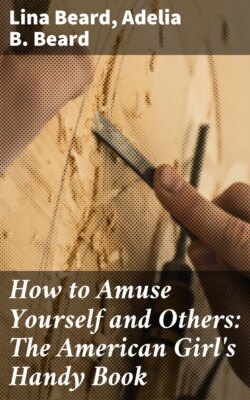Читать книгу How to Amuse Yourself and Others: The American Girl's Handy Book - Adelia B. Beard - Страница 30
На сайте Литреса книга снята с продажи.
CHAPTER IV.
EASTER.
ОглавлениеTable of Contents
EVERYWHERE the children are playing with eggs; eggs colored in every hue—mottled, striped, and gilded; real eggs and imitation ones; sugar, glass, and wooden eggs; for this is Easter-tide, and not only in America, but in many far-away countries, where the habits and customs are very different from ours, does Easter bring to the children the highly prized, gayly-colored eggs.
How nice it would be if we could take a peep into these foreign countries, and discover what else Easter brings the little ones besides the pretty eggs, and also how the people of such widely differing nations keep this happy festival common to all.
If we could look into England now, we should find that the ceremonies there begin on Palm Sunday (the last Sunday before Easter), and on that day many people go a-palming, only they do not, of course, find palm, but gather instead branches of willow, which they stick into their hats and button-holes. On Good-Friday we might see, on almost every breakfast-table, those hot spicy cakes with a cross stamped on the face, known to many of us as well as to our English cousins, as “hot cross buns.” We should feel very much at home looking into the churches on Easter Sunday, for we should find them beautifully decorated with flowers, and hear the Easter anthems chanted as we might in our own country. I do not think we can see in America, though, the ceremony which, on Easter Monday, is performed by the charity school-children in England. Were we among the spectators who, with shouts and merry laughter, crowd around to watch this performance, we should see the children take their places, with their backs against the outside of the church, and then join hands until a circle is formed around the building, thus completing what is called “clipping the church.”
It would be great fun to see the Easter celebration in Russia, which includes many peculiar customs, and where the children receive presents as we do at Christmas, besides more eggs than any of us ever thought of possessing; some of the eggs being beautifully made of glass or porcelain, and filled with sugar-plums or small presents. How amusing it would be to watch the people, following a custom always observed on Easter Monday in this queer land, as they go about kissing relations, friends, and acquaintances, wherever they happen to meet them.
If we were really in this great, cold, furry country, we might go with the children to make their Easter visits, and, on entering a house, hear the greeting, “Jesus Christ is risen,” and the answer, “Yes, he is risen;” then after kissing the inmates and exchanging eggs with them, go to visit elsewhere.
All this would seem very strange to American eyes; and it would be a strange sight too, if we could look into the cities of Spain and see the people in the streets shooting at stuffed figures of Judas Iscariot.
A passing glance at Ireland on Easter morning would show us the people making haste to be out at sunrise to see the sun dance in a pool or pail of clear water.
It would be worth while to give more than a passing glance into Germany at this season, for in this country, where the children’s happiness is so much thought of and so well provided for, Easter Monday is looked upon as a grand holiday, and all the young people appear in their gala costumes ready for any fun or frolic that may be going on. It is a pretty sight when the little peasant-girls, in their quaint gowns and odd little caps, dance on the green with the boys, whose costumes are equally as picturesque; and it is also entertaining to watch them as they play various games with their many-colored eggs.
In Germany, too, we should find that the children believe as sincerely in the Easter hare as they do in Santa Claus in our country; and the saying, that “the hares lay the Easter eggs,” is never doubted by the little ones.
After visiting in imagination all these foreign countries to see their Easter celebrations, it may prove interesting to turn our eyes toward home, for, since our country is so large—as large almost as all Europe put together—perhaps some of our little citizens who have never been in Washington do not know how, in the capital of the United States, the children hold high carnival on Easter Monday, nor how the grounds of the White House and also of the Capitol are given up to them on this day that they may frolic on the lawns and roll their eggs down the hills. It would be as novel a sight to some of us as any found abroad, to see several thousand children rolling and tossing their eggs, while shells of every hue cover the grass in all directions.
The following newspaper item, cut from the Evening Star, Washington, D. C., April 27, 1886, shows how these rights of the little Americans are recognized and respected, and how unmolested they enjoy the privileges of Easter Monday.
“THE EASTER EGG-ROLLING.
“CHILDREN SHAKE HANDS WITH THE PRESIDENT.
“The crowd in the White House grounds greatly increased yesterday afternoon, so that the grounds were literally packed with children. The crowd was the largest and best appearing that has collected there in many years. The President and Colonel Lamont watched the children for some time from the library window.
At the President’s reception at half-past one o’clock hundreds of children gave up their sport temporarily and thronged the East Room to shake hands with the President.”
